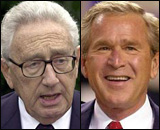
Everyone knew what Bush was going to say before he made his address last night. And the “surge” that Democrats hoped to block had already begun, with advance elements of the 82nd Airborne in Baghdad to arrange for arrivals of 17,500 more troops. “If we increase our support at this crucial moment, and help the Iraqis break the current cycle of violence, we can hasten the day our troops begin coming home,” Bush said.
What Bush proposed was a straightforward pacification program in Baghdad, made possible by an intensified American occupation — a facade of Iraqis, to be sure, but with Americans running the show, just as GIs ended up running the show in a massive gun battle on Baghdad’s Haifa Street Tuesday.
As Bush has said in the past, Americans know what the word victory means, So, whatever happens, and no matter what anyone says, America must win: “Failure in Iraq would be a disaster for the United States.”
As usual, observers are grasping wildly for an explanations as to why Bush is doing what he’s doing. No matter what one thinks of the President, when push comes to shove, it’s hard to believe he really wants to drag out the war so it can be handed over to a successor in 2008; or that he is such a psycho he can’t stop referring to defeat as victory. That’s not the kind of stuff the Bush family legacy is made of.
There may well be a much more sinister game plan here, one that centers around the emergence of Henry Kissinger over the last year as an adviser to Bush and other top officials in Washington. Gareth Porter, the historian who ran the Indochina Resource Center in the early 70s, points out in a January 11 article in Asia Online that “although he knows very little about how to deal with Sunnis and Shi’ites, Kissinger does know how to convey to the public the illusion of victory, even though the U.S. position in the war is actually weak and unstable.”
Porter continues, “One of Kissinger’s accomplishments was to sell the news media on the Nixon administration’s propaganda line that the Christmas 1972 bombing of Hanoi had so unnerved the North Vietnamese that it had allowed president Richard Nixon and Kissinger to achieve a diplomatic victory over the communists in the Paris Agreement. That line was a gross distortion of what actually happened before and after the bombing.” Moreover, it was Kissinger who figured out how Ford could claim a Vietnam victory and blame the whole mess on the Democrats.
So, it’s quite possible that Bush will plunge into a counterinsurgency operation in Baghdad and elsewhere in Iraq, and then amidst mass civilian carnage, declare victory and announce negotiations — which sooner or later will have to happen. But things may not work out that way, as the Haifa Street firefight Tuesday — in which American troops found themselves in the middle of an ongoing ethnic cleansing operation by Shia militias — made clear.
GIs call Haifa Street “grenade alley.” As Juan Cole points out, Haifa Street has become a fixture of the civil war, twisting and turning in one pacification effort after another. In July 2004, U.S. commanders deployed 3,000 troops in a mini-surge called Operation Haifa Street. A police station got blown up in a major bombing there. In March 2005, reports had things calming down a bit, and some said the tide had turned. Today Haifa Street is once again considered a terrorist stronghold — thus the U.S. operation — but things are getting ever more complicated, with at least one report in Arabic claiming Shia invaded the area Sunday, killed residents, and threw their bodies into the street. “In this context, some Sunni Arabs see the U.S. as having been duped by the Shiites to join in the ethnic cleansing of the Karkh district,” says Cole. And now there are reports that Shia militias are worming their way into the Green Zone, a feat long attempted unsuccessfully by Sunni insurgents. So is the Bush administration simply throwing in its lot with one set of death squads over another? It wouldn’t be the first time.







